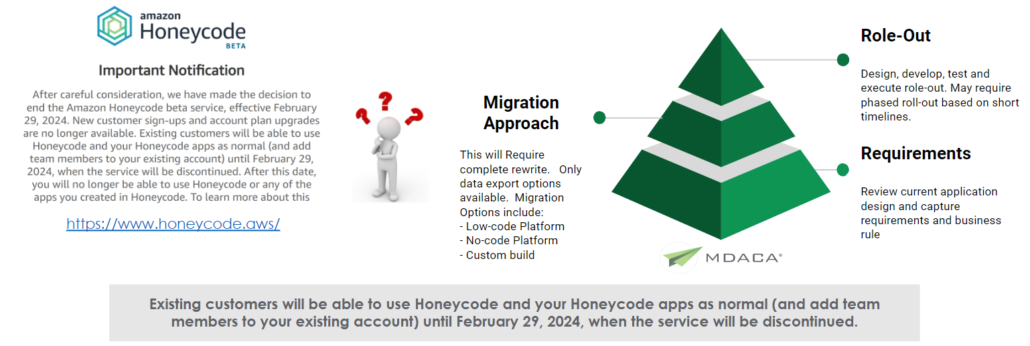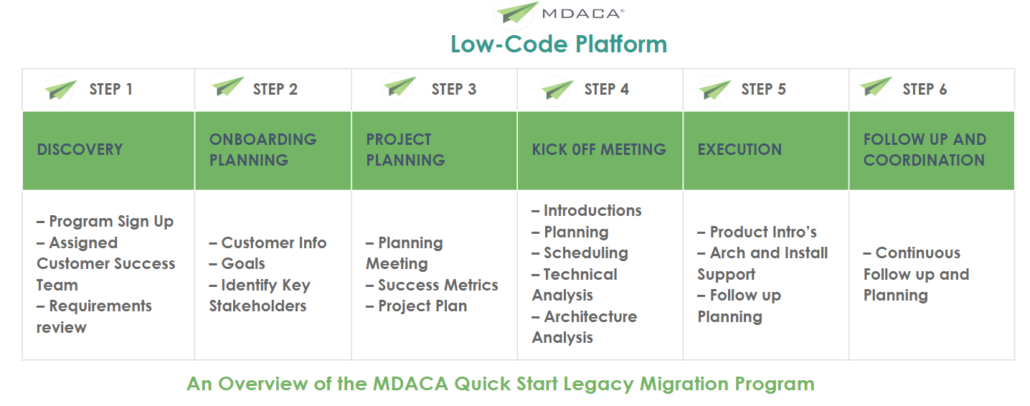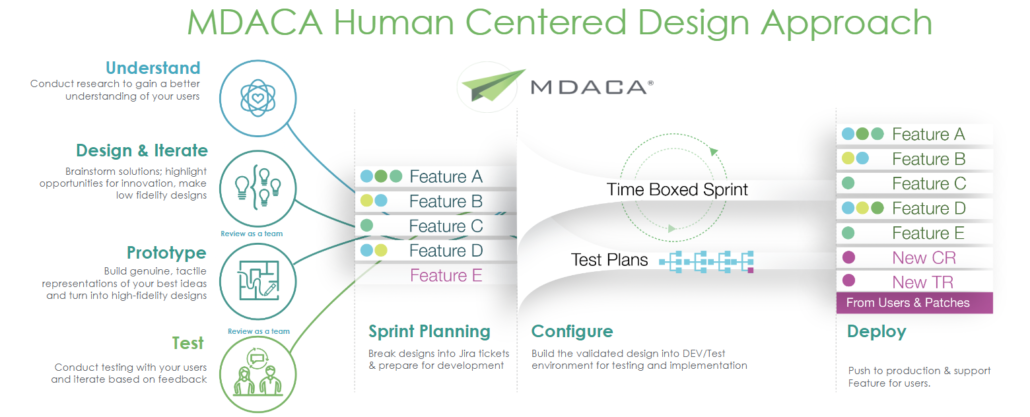The Business Challenge
The sunset of the Amazon Honeycode no-code platform has raised concerns among its users regarding their investments and business options. With the platform being discontinued, users may need to find an alternative to meet their business needs. This can be a time consuming and complex process, requiring additional investments of time and resources. Additionally, users may need to migrate their data to the new platform, train their employees on how to use it, and integrate it with existing systems. The transition to a new platform may also cause a temporary loss of productivity. In this context, businesses need to carefully evaluate their options and make informed decisions to ensure a smooth transition and minimize any potential disruptions for the sunrise of this digital transformation.
For the user community with investments of time, effort, and resources into Amazon Honeycode-supported applications, imminent challenges and considerations include:
- Review of requirements: This will require a full application redesign and migration, as the only option is for data export of current application data. This will require following steps typically utilized in legacy application migration.
- Finding an alternative platform: Users of Honeycode likely need to find an alternative such as: no-code, low-code or rebuild a custom-based application to meet their business needs. This may require additional time and resources to research and evaluate other options.
- Data migration: Users transitioning from Amazon Honeycode will need to migrate their data to another platform. This can be a time-consuming, complex process.
- Training and re-skilling: Switching to a new platform will likely require training for employees to use the new platform effectively and efficiently. This can be a significant investment in time and resources.
- Integration with existing systems: Users transitioning from Amazon Honeycode may need to integrate their new platform with existing systems. This can be challenging and require additional development work.
- Loss of productivity: The transition to a new platform may cause a temporary loss of productivity as users adjust to the new system and workflows. This may impact business processes and/or timelines.
Overall, the sunset of Amazon Honeycode may require organizations to invest additional time and resources to find and implement a new, performant platform for continued support of their business needs.
What is MDACA Low-Code
MDACA Low-Code based solutions have a proven track record of success by Fortune 500 companies and Government agencies for over 20 years. The platform dynamically evolves to meet critical business needs as part of the enterprise data fabric solution, supporting an agile approach while taking data management best practices into account. With its flexible and customizable platform, the MDACA Low-Code platform can support businesses in the migration from Amazon Honeycode by providing a solution adaptable to meet their specific needs. A team of business analysts and developers can collaborate to design and develop a solution aligned with the unique requirements of the business.
The platform provides unlimited flexibility in User Interface (UI) design, allowing businesses to create an intuitive, easy to use UI. Additionally, the MDACA Low-Code platform delivers enterprise-grade solutions leveraging flexible low-code technology, ensuring the solution is scalable, secure, and reliable. This can help businesses to migrate their data and workflows from Honeycode to the new platform with minimal disruption and maximum efficiency.
| Amazon Honeycode (no code) | MDACA Low-Code Platform | |
| Customization | Limited – While Honeycode offers pre-built templates, workflows, and UI components, it may not always be possible to create a fully customized application meeting all your specific needs. The platform’s limitations on customization may not be able to provide the exact solution needed for the use case(s). | Unlimited – MDACA’s flexible UI provides a highly versatile approach to customization by offering both pre-built templates and the ability to design UIs from scratch. The platform’s separation of UI and API-based integration layer allows you to create a fully custom application for all your specific needs. |
| Integration with Other Services | Limited – Honeycode is an AWS service. While it can integrate with other AWS services, its integration capabilities with external services or platforms is limited. | Unlimited – MDACA is a highly flexible and customizable platform offering seamless integration with a wide range of external services allowing you to leverage both existing and new technology investments. |
| Data Management | Current challenges in adhering to best practices on data management, such as suboptimal data storage approaches, lock-in to metadata stores, and limited or non-existent entity-relationship diagrams (ERDs). | MDACA addresses data management challenges by separating the low-code database from the application database, allowing for flexibility in leveraging existing databases and supporting a wide range of application database types while following customer policies and best practices. |
| Enterprise Grade | Costs are based on a per-user model, which can result in increased costs as user count increases. Challenges exist in handling complex queries that require the transformation of stored data. Limited integration with existing security systems (e.g., DoD CAC) and road maps not yet DoD-compliant or FedRAMP-certified. Requires redesign/migration of legacy databases for application modernization. | MDACA’s cost is based on a server model, which provides cost predictability and scalability. The separation of the metadata store from the client data also allows for flexibility in supporting a wide range of application database types, including MySQL, Postgres, SQL Server, Oracle, Object storage, and others. Additionally, MDACA offers wide integrations with existing security systems (e.g., DoD CAC). Minimized need for redesign or migration of legacy databases for application modernization. |
| Vendor Lock-in | Vendor lock-in is a limitation of Amazon Honeycode, as it is a proprietary product of AWS and may require significant effort to migrate to another platform. This can limit the flexibility and portability of applications built on Honeycode, as they may be tied to AWS infrastructure and services. Additionally, vendor lock-in can impact the ability to negotiate pricing and terms, as well as limit the ability to customize or extend the platform beyond its existing capabilities. | MDACA is based on an open-core model, allowing for greater flexibility and portability. It can be deployed with a wide range of options to include cloud, cloud adjacent, or on-premises environments. The data is owned and fully managed by you on a database of your choice, affording greater control and security. Additionally, code can be shared based on a collaborative model, which encourages greater collaboration and innovation among developers. |
| Stability | AWS announced existing customers will be able to use Honeycode until February 29, 2024, when the service will be discontinued. | MDACA-based solutions have a 20-year proven track record of supporting and adapting to the needs of Fortune 500 companies and Government agencies. |
The Roadmap
Successful digital transformation requires a holistic approach with consideration of processes and people as well as the technology. Our technology accelerators principles and practices, coupled with an agile approach and data management best practices, empower us to deliver solutions tailored to our customers needs. The MDACA Low-Code platform is designed to support this approach, leveraging agile practices and user-centered design to enable organizations to deliver efficient and effective solutions while meeting the unique needs of their varied customers.
It’s important to take a comprehensive approach to application migrations by considering all aspects of the process the solution supports. This includes conducting an application review to identify key components leveraged by the application and making a platform migration decision. It’s also important to extract and analyze the data in the application and consider enterprise data management concepts as part of the design needs for the future. Once the current application and new enterprise needs have been assessed and analyzed based on the features of the new platform, a roadmap for the migration can be developed to address the migration plan, quality assurance, and application rollout. Additionally, a user-centered design and approach is essential to ensure the new application seamlessly and intuitively fulfills user needs, promoting ease of use and navigation.
User Centered Agile Design Approach
The MDACA Low-Code platform leverages a user-centered design approach to help accelerate the solution delivery and adoption process.
With MDACA, developers can easily involve users in the design process from the beginning and gain valuable insights into their needs and preferences. This can inform the design of the application and lead to a more efficient and effective solution capable of meeting the unique needs of its users with rapid adoption. Additionally, MDACA’s Low-Code platform can help to speed up the development process by providing pre-built components and templates; these may be easily customized and configured to meet the specific needs of the solution. This can help to reduce the time and cost of development while ensuring the final product is of high quality and meets the needs of its users.
Supporting Master Data Management
MDACA’s Data Fabric Platform is a powerful tool capable of providing significant value as part of an enterprise data management strategy. It combines industry-leading data integration, application and API integration, and data governance capabilities into a single low-code platform compatible with virtually any data source and architecture. With data quality embedded into every step of the data journey, teams can trust the data they use for critical business decisions.
MDACA Data Fabric Platform provides organizations with a single view of their data available in the cloud, on-premises, or in a hybrid configuration while simplifying compliance with master data management principles and standards. Additionally, the MDACA Data Fabric Platform can easily integrate with complementary systems, making it a flexible and scalable solution for organizations of all sizes. By placing trusted data in the right hands at the right time, MDACA can help organizations make data-driven, informed decisions with more speed and confidence.
Conclusion and Recommendations
As Amazon Honeycode is set to discontinue February 29, 2024, organizations with applications built on the platform will need to consider migration to an alternative solution. MDACA’s Low-Code platform can provide a valuable alternative. With its open-core model, MDACA offers greater flexibility and portability, allowing organizations to deploy their applications in the cloud, cloud adjacent, or on-premises. Additionally, MDACA’s Low-Code platform is designed to support a user-centric design approach, ensuring the resulting application meets the needs of its users and is easy to use and navigate.
Key challenges organizations may face during the migration process include handling complex queries that require the transformation of stored data, limited integration with existing security systems, and the need to redesign or migrate legacy databases for application modernization. To address these challenges, organizations should conduct a comprehensive application review, identify key components leveraged by the application, and develop a roadmap for the migration supportive of the migration plan, quality assurance, and application rollout.
For executive and business users, it’s important to consider the value of a user-centered design approach and how it can help to ensure the resulting application meets the needs of users. Additionally, organizations should consider the value of MDACA as it combines industry-leading data integration, application and API integration, and data governance capabilities into a single low-code platform with versatility to work with virtually any data source and architecture. By leveraging MDACA’s Low-Code platform and Data Fabric, organizations can improve their enterprise data management strategy, build applications designed to effectively manage and utilize data, and confidently make informed decisions based on reliable data.
At MDACA, we are committed to helping organizations navigate the process of transitioning Amazon Honeycode-based applications, as well as any legacy application or new application development. Our team of experts can provide guidance and support throughout the migration process, ensuring a smooth and efficient transition to a new, versatile solution needed for your continued digital transformation. To learn more about MDACA and how we can help your organization, please visit MDACA.io.





